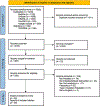Cost-effectiveness analysis of individual-level obesity treatment in paediatrics: A scoping review
- PMID: 38287524
- PMCID: PMC11554291
- DOI: 10.1111/ijpo.13100
Cost-effectiveness analysis of individual-level obesity treatment in paediatrics: A scoping review
Abstract
Objectives: This scoping review informs a health economics perspective on the treatment of paediatric obesity. The results detail recently published research findings on the cost-effectiveness of paediatric obesity treatments and identify key characteristics of cost-effective interventions.
Methods: A structured search was applied to six databases with no data restriction through March 2023: Medline, Embase, Cochrane CENTRAL, CINAHL, and PsycINFO. Studies that included a cost analysis of an individual level, weight management intervention (behavioural, pharmacotherapy, and surgical) in youth, with obesity, ages 2 to 21 years were eligible for inclusion.
Results: Of the 4371 records identified in the initial search, 353 underwent full-text review, 39 studies met the pre-specified inclusion criteria. The majority were published after 2010 (n = 36/39, 92%) and applied to high-income countries (n = 39/39, 100%). Thirty-five of the studies assessed the cost-effectiveness of lifestyle interventions (90%), and four studies assessed surgical outcomes (10%). No pharmacotherapy studies met eligibility criteria. Although the outcome measures differed across the studies, all four surgical interventions were reported to be cost-effective. Thirty of the 35 (85%) lifestyle modification studies were reported to be cost-effective compared to the study comparator examined.
Conclusions: There is a small amount of evidence that individual-level paediatric obesity treatment interventions are cost-effective and, in some cases cost-saving, with most of this work conducted on behavioural interventions. The economic evaluation of paediatric obesity interventions poses various methodologic challenges, which should be addressed in future research to fully use the potential of economic evaluation as an aid to decision-making.
Keywords: childhood obesity; cost-effectiveness; weight management.
© 2024 World Obesity Federation.
Conflict of interest statement
CONFLICT OF INTEREST STATEMENT
The authors have no financial relationships or conflict of interest relevant to this article to disclose.
Figures



Similar articles
-
Behavioural modification interventions for medically unexplained symptoms in primary care: systematic reviews and economic evaluation.Health Technol Assess. 2020 Sep;24(46):1-490. doi: 10.3310/hta24460. Health Technol Assess. 2020. PMID: 32975190 Free PMC article.
-
Strategies used for childhood chronic functional constipation: the SUCCESS evidence synthesis.Health Technol Assess. 2024 Jan;28(5):1-266. doi: 10.3310/PLTR9622. Health Technol Assess. 2024. PMID: 38343084 Free PMC article.
-
Beyond the black stump: rapid reviews of health research issues affecting regional, rural and remote Australia.Med J Aust. 2020 Dec;213 Suppl 11:S3-S32.e1. doi: 10.5694/mja2.50881. Med J Aust. 2020. PMID: 33314144
-
A scoping review of cost-effectiveness analyses of school-based interventions for caries.Community Dent Oral Epidemiol. 2020 Oct;48(5):357-363. doi: 10.1111/cdoe.12553. Epub 2020 Jun 16. Community Dent Oral Epidemiol. 2020. PMID: 32548874
-
Behavioural interventions for type 2 diabetes: an evidence-based analysis.Ont Health Technol Assess Ser. 2009;9(21):1-45. Epub 2009 Oct 1. Ont Health Technol Assess Ser. 2009. PMID: 23074526 Free PMC article.
References
Publication types
MeSH terms
Grants and funding
LinkOut - more resources
Full Text Sources
Medical
Miscellaneous

